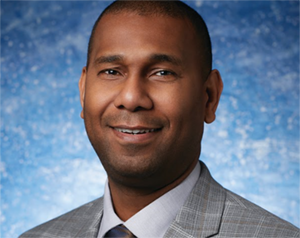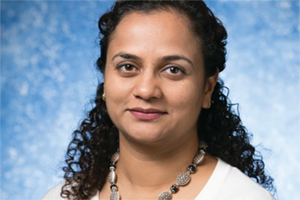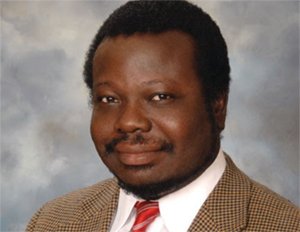Faculty Under the Microscope: A Closer Look at USciences Faculty Research

Editor's note: This article was written prior to University of the Sciences' merger with and into Saint Joseph's University and does not reflect the current, combined institution. References to programs, offices, colleges, employees, etc., may be historical information.
USciences faculty researchers are passionate about their areas of interest. In these interviews, faculty members discuss how they got involved in their research and what keeps them interested.
 Sylvester Carter MHS, PhD, CEEAA is a physical therapist with 18 years of experience in both clinical and academic settings. Sylvester earned his Master of Health Science in Physical Therapy from the University of Indianapolis and his PhD in Pathokinesiology from New York University, where his research focused on identifying gait characteristics that may be associated with trip-related falls occurring on level ground.
Sylvester Carter MHS, PhD, CEEAA is a physical therapist with 18 years of experience in both clinical and academic settings. Sylvester earned his Master of Health Science in Physical Therapy from the University of Indianapolis and his PhD in Pathokinesiology from New York University, where his research focused on identifying gait characteristics that may be associated with trip-related falls occurring on level ground.
Q: What has being a Physical Therapist taught you?
A: I have met people from all corners of the globe. This experience reaffirms in me the belief that despite our individual differences, we have much more in common. Our shared humanity was exemplified for me by a gentleman of Asian descent when our only means of communication was through affirming or disaffirming nods interspersed with moments of laughter as we worked through a treatment program. Our human connection transcended words. I have also learned the importance of resilience in the face of unspeakable odds, particularly from one lady with scleroderma. She instilled in me a belief in self that is untethered from arrogance. It is because of these people that I constantly reaffirm my commitment to learn, grow, and evolve in my role as a physical therapist.
Q: What’s your favorite part of the USciences community?
A: My favorite part of being a part of the USciences community is the intimacy and collegiality. I have been on larger campuses where I would never interact with someone from the basic sciences. I think the opportunity to exchange ideas across fields can only benefit this University. Further, I have only been greeted with warmth and support since embarking on my journey here at USciences.
Q: What keeps you passionate about this field?
A: I think the thing that keeps me passionate is a desire to keep growing. I truly believe the day that I feel there is nothing more to learn, explore, or achieve in physical therapy is the day I will walk away. However, for now, I am excited by the many questions that needed to be explored and the opportunities to inspire the next generation of therapists.
 Bela Peethambaran PhD, Associate Professor of Biology is a plant molecular biologist with 10 years of experience in isolation of drugs from medicinal herbs. Dr. Peethambaran earned her Ph.D in Molecular Biology from Mississippi State University with a focus on plant stress signaling. Her postdoctoral work at University of Minnesota and Villanova University further her investigation on how plants respond to abiotic stress. She used these opportunities to develop a project to harvest natural compounds that had the ability to kill cancer cells. Currently, her laboratory focuses on medicinal herbs for isolation of compounds that can selectively target an aggressive subtype of breast cancer.
Bela Peethambaran PhD, Associate Professor of Biology is a plant molecular biologist with 10 years of experience in isolation of drugs from medicinal herbs. Dr. Peethambaran earned her Ph.D in Molecular Biology from Mississippi State University with a focus on plant stress signaling. Her postdoctoral work at University of Minnesota and Villanova University further her investigation on how plants respond to abiotic stress. She used these opportunities to develop a project to harvest natural compounds that had the ability to kill cancer cells. Currently, her laboratory focuses on medicinal herbs for isolation of compounds that can selectively target an aggressive subtype of breast cancer.
Q: What made you want to get into your field of study?
A: Triple-negative breast cancer (TNBC) is a heterogeneous and aggressive subtype of breast cancer, making up 10-20% of newly diagnosed invasive breast cancers. As such, no targeted agents are approved for systemic therapy. Additionally, TNBC incidences are disproportionately higher in African-American and Hispanic women compared to European-American women. A significant challenge of TNBC is the poor prognosis and the toxic side effects of anti-cancer drugs. Leveraging my training in plant molecular biology, I have set up the research program concentrating on the isolation and characterization of natural compounds in order to target TNBC and generate minimal effects on normal cells selectively. In 2017, we successfully identified a novel compound from a medicinal herb called Myrothamnus flabellifolius that can be developed as a drug lead for TNBC. This discovery is only scratching the surface; next, we are investigating the anti-cancer mechanisms to create plant-based cancer therapeutics.
Q: What is the biggest change you have seen in the field throughout your time?
A: Finding drugs that protect patients is a crucial mission for both the pharmaceutical industry and academia. There is a resurgence of interest in natural products as it is an endless resource to finding pharmacologically important and novel drugs. Drug discovery research from natural products remained under-appreciated because of the substantial time it takes to establish a natural compound as a drug. However, in the last 10 years, advancement in the analytical, molecular, and bioinformatics techniques has enabled faster drug discovery processes.
Q: What’s your favorite part of the USciences community?
A: Students in USciences are passionate about learning. They understand the value of research and are incredibly committed to their research projects. Also, training students in research, classrooms, and watching them develop into fabulous scientists is the most gratifying part of this job.
 Adeboye Adejare PhD, Professor of Pharmaceutical Sciences earned his BS and MS from University of Iowa, and his PhD in Medicinal Chemistry from Ohio State University. Adejare is interested in the areas of design and synthesis of small organic molecules to probe neurodegeneration as well as in vitro models of drug absorption and ability to cross blood brain barrier; drug targeting; pharmaceutical profiling; and chemistry of fluoroaromatic compounds.
Adeboye Adejare PhD, Professor of Pharmaceutical Sciences earned his BS and MS from University of Iowa, and his PhD in Medicinal Chemistry from Ohio State University. Adejare is interested in the areas of design and synthesis of small organic molecules to probe neurodegeneration as well as in vitro models of drug absorption and ability to cross blood brain barrier; drug targeting; pharmaceutical profiling; and chemistry of fluoroaromatic compounds.
Q: What made you want to get into your field of study?
A: I have always been interested in drug discovery with a view to helping humanity. When I began my career over 30 years ago, it became clear to me that we were living longer and therefore diseases associated with aging would present great opportunities in the future. Hence, I gravitated towards Alzheimer’s disease which remains the core of my research activities even up until today. I also grew up wanting to become a university professor because of the excellence and prestige it entailed.
Q:What is your favorite part and what has it taught you?
A: I have been lucky to be able to be able pursue a career where both of my major ambitions could be accommodated. I really enjoy teaching. I welcome the extra challenge of getting students in a large class engaged at 8 a.m. in the morning!
What I have learned is that drug discovery is not as simple as it sounds! Discovery of a new drug takes years, many people, and lots of money! Because of the many steps involved, I have also learned that one has to focus on a step or two. I chose the initial step of drug design and synthesis.
Q: What keeps you passionate about this field?
A: I like the freedom that being in academia provides. There are many opportunities that one can take advantage of. I spent last summer as a Carnegie Fellow. I have a Fulbright Scholar in my lab. I am working feverishly on pushing out the next edition of Remington: The Science and Practice of Pharmacy, which is PCP’s signatory publication. So, for me, there is always that next big challenge and this keeps me working extra hard!
